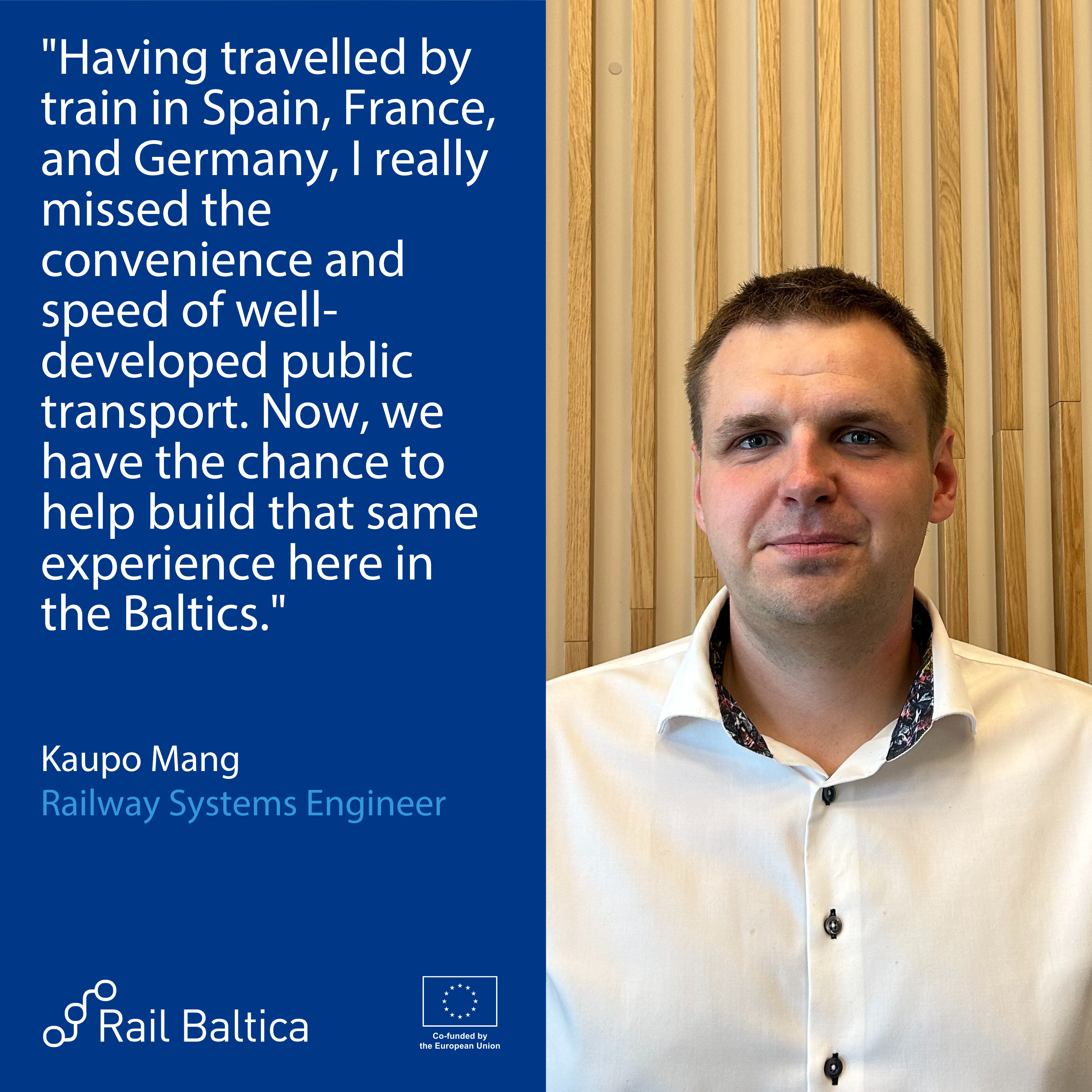Rail Baltica is a railway infrastructure megaproject that spans across several countries. The depth of skills and expertise required to successfully execute a greenfield project of this caliber is extensive and would not be possible without our diverse team of professionals.
Welcome back to our series, “Rail Baltica: The People Behind the Vision,” where we introduce you to the members of the Rail Baltica global project team. These individuals are the driving force advancing the Rail Baltica project with their professionalism, dedication, and passion for this project.
 Kaupo Mang, Railway Systems Engineer, RB Rail AS
Kaupo Mang, Railway Systems Engineer, RB Rail AS
This week, we are pleased to introduce Kaupo Mang, Railway Systems Engineer at RB Rail AS. With a deep interest in technology and complex infrastructure, Kaupo joined the Rail Baltica project two years ago to help bring high-speed rail to the Baltics. His curiosity, problem-solving mindset, and passion for innovation continue to drive his work on one of Europe’s most ambitious transport projects.
What is it about the rail industry that you love?
It is hard to point to one specific reason – it is more of a combination of many things. I live near a railway, and I have always been interested in technology and engineering. Estonian Railways is over 150 years old, and while working there, it was fascinating to hear old stories from colleagues. By now, many of my acquaintances are connected to the railway. At first glance, railways may seem simple, but the deeper you dive into it, the more complex it becomes.
When did you join the Rail Baltica project and what inspired you to become a part of the team?
I joined Rail Baltica two years ago, and time has flown by. Before that, I spent over six years working at Estonian Railways, and joining Rail Baltica felt like an exciting opportunity to contribute to a major infrastructure project. Having travelled by train in Spain, France, and Germany, I really missed the convenience and speed of well-developed public transport. Now, we have the chance to help build that same experience here in the Baltics.
What advice would you give to a newcomer joining the Rail Baltica project team?
My advice to a new employee is to stay calm – everything will start to make sense with time. I still remember the evening after my first day, when my head felt like it might explode because everything seemed so complex and overwhelming. But as time went on, I gradually began to understand how things work. There are still challenging moments, of course, but nothing is impossible. Where there is a will, there is a way.
What specific contribution or skill do you believe you bring to the Rail Baltica project team that sets you apart from others?
I would not say I am any more special than others, but I have always been curious about how things are built and how they work. When I worked at Estonian Railways, I visited construction sites whenever I had the chance and asked my colleagues questions about their work. That curiosity has served me well at Rail Baltica, helping me to better understand the bigger picture.
What hobbies, interests, talents do you have?
I play geocaching – it is a global game where you use GPS coordinates to search for hidden containers, often called “caches.” If you find one, you sign your name in the logbook inside. Since these caches come in all shapes, sizes, and locations – hidden in cities, forests, 25 metres up in a tree, 10 metres underwater, on remote islands, or deep in bogs – it is more of a lifestyle than just a hobby. The goal of the game is to showcase beautiful and unique places. I have found over 7,000 caches in Estonia alone, so I have seen most of the country’s hidden gems.
What do you believe is the most challenging aspect of this mega project?
I would not say it is one specific thing. It is more about the interaction of a million different elements. When there is a big problem, you need to break it down into smaller pieces until you can solve it. At the same time, you have to keep in mind how all the other pieces interact and be able to see the whole picture.
In your career, what is the biggest challenge you have had to overcome?
Six years ago, I was assigned at work to write the procurement tender for the modernisation of level crossings. At first glance, it seemed like a simple task, but as time went on, more details emerged: removing old equipment, acquiring new equipment, installation, testing, connecting to railway stations, and setting up monitoring systems. In the end, the technical specifications added up to several dozen pages to modernise 100 level crossings. After several months of international tendering, the employer signed a contract worth 11 million euros.
In your opinion what is the recipe for success, for team, career or otherwise?
Be positive, respect others, and stay solution-oriented. When facing a problem, it is easy to list a hundred reasons why something cannot be done – but it is much more valuable to find one way it can be solved.
